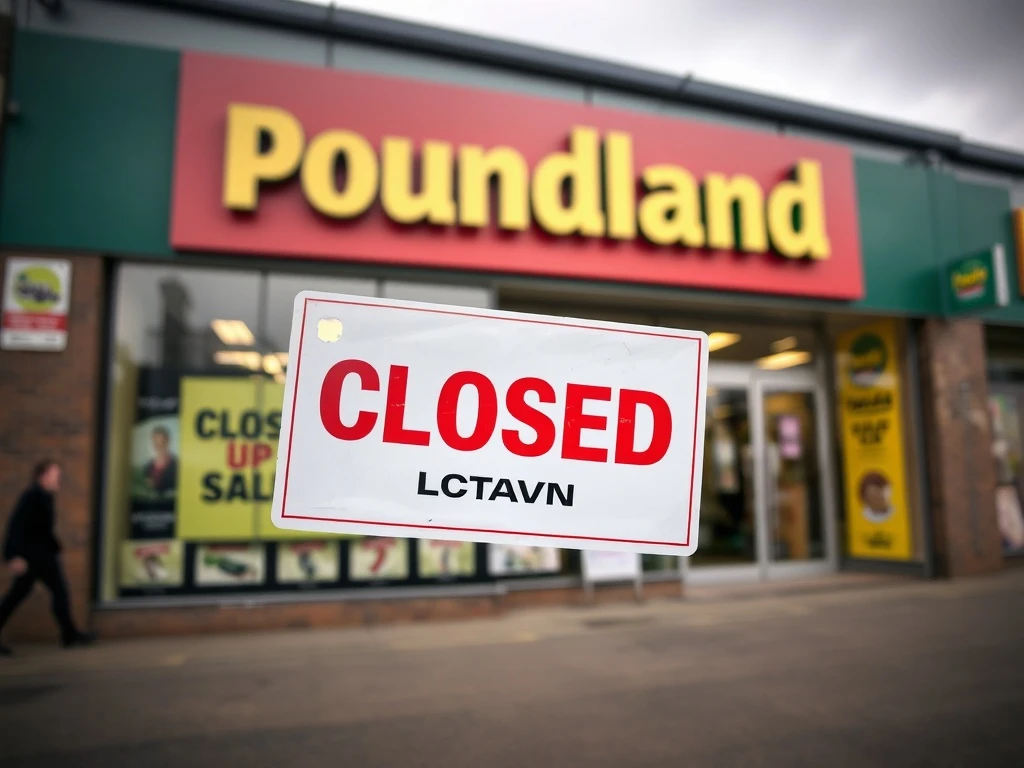The UK retail landscape faces another significant shift. Poundland store closures are set to impact communities nationwide. This major restructuring signals a new era for the discount retailer. Businesses and consumers alike are watching closely. The decisions reflect a challenging economic climate. They also highlight a strategic pivot by new ownership.
Poundland Store Closures: A Sweeping Restructuring Plan Unfolds
Poundland, the well-known discount retailer, is undertaking a significant restructuring. This comprehensive plan involves closing 49 stores across the United Kingdom. New owners Gordon Brothers are driving these pivotal changes. The first wave of closures began on August 11, 2025. On that day, ten branches permanently shut their doors. Further closures are scheduled throughout August and into September. This extensive programme aims to streamline Poundland’s operations. Ultimately, it seeks to ensure the company’s long-term viability. This move represents a strategic effort. It responds to evolving market conditions. Furthermore, it addresses recent financial performance.
Details of the Poundland Store Closures: What You Need to Know
The current restructuring plan targets nearly 70 stores from Poundland’s vast 800-strong network. Three locations have already ceased trading. This leaves 16 more closures to be confirmed later this year. The initial phase of Poundland store closures impacts specific regions. These closures are staggered over several weeks. This approach aims to manage the transition. It also allows for careful planning. Here is a detailed breakdown of the affected locations and their closure dates:
- August 11: Ammanford, Birmingham Fort, Cardiff Valegate, Cramlington, Leicester, Long Eaton, Port Glasgow, Seaham, Shrewsbury, Tunbridge Wells.
- August 17: Bedford, Bidston Moss, Broxburn, Craigavon, Dartmouth, East Dulwich, Falmouth, Hull St Andrews, Newtonabbey, Perth, Poole, Sunderland, Stafford, Thornaby, Worcester.
- August 24: Brigg, Canterbury, Coventry, Newcastle, Kings Heath, Peterborough, Peterlee, Rainham, Salford, Sheldon, Wells, Whitechapel.
- August 31: Blackburn, Cookstown, Erdington, Kimberley, Horsham, Hull Holderness, Kettering, Omagh, Shepherds Bush, Southport, Taunton.
The final store in this specific wave, located in Irvine, North Ayrshire, will close on September 14. These actions are a direct result of the company’s strategic overhaul. They reflect a determined effort to optimize the store portfolio. This ensures resources are directed to the most productive locations.
Behind the Restructuring: New Ownership and Financial Pressures Driving Poundland Store Closures
US investment firm Gordon Brothers acquired Poundland in June. They bought the retailer from Polish parent Pepco Group for a nominal £1. This acquisition marked a pivotal moment for the discount chain. The new owners immediately embarked on a comprehensive restructuring. Poundland has faced significant financial challenges. For instance, revenue dropped by 6.5% to £830 million in the six months to March. This decline highlights a period of intense pressure. Pepco attributed these struggles to “highly challenging trading conditions.” These conditions affected all categories. Consequently, Gordon Brothers initiated drastic measures to stabilise the business. Their strategy focuses on efficiency. It also prioritises long-term profitability. This involves making tough decisions about the retail footprint.
Strategic Shifts: Beyond Just Poundland Store Closures
The restructuring extends far beyond just closing stores. Poundland retail director Darren MacDonald explained the overarching goal. He stated the aim is to maintain a “sizeable” network. This network will consist of 650–700 stores. MacDonald acknowledged the regrettable impact on customers and staff. However, these steps are deemed necessary for future success. Staff in affected stores are currently in consultation. Redeployment options are being actively explored. This commitment aims to mitigate job losses where possible. It supports employees during this transition.
Furthermore, the comprehensive plan includes several key operational changes. These adjustments aim to refine Poundland’s business model:
- Rent Negotiations: Discussions are underway at various locations. The goal is to secure more favourable lease terms. This reduces operational overheads.
- Distribution Centre Consolidations: The frozen and digital distribution centre in Darton, South Yorkshire, will close later this year. Additionally, the Bilston, West Midlands distribution hub will shut by early 2026. These closures streamline logistics. They also reduce supply chain costs.
- Product Range Adjustments: Frozen products will be entirely discontinued. Chilled food ranges will also be significantly reduced. This decision reflects a focus on core, high-performing product lines. It optimizes shelf space.
- Online Sales Discontinuation: Poundland will end its online sales operations. This move allows the retailer to concentrate resources on its physical store network. It simplifies the business model.
- Expansion Areas: The retailer plans to expand its womenswear and seasonal product ranges. This strategic pivot aims to capture new market segments. It also seeks to boost higher-margin sales.
These strategic shifts require High Court approval. This decision is expected later this month. Successful implementation will be crucial. It will determine the effectiveness of the restructuring.
Impact on Communities and the Broader UK Retail Landscape from Poundland Store Closures
The announcement of Poundland store closures creates uncertainty. Local communities will lose familiar shopping destinations. This could affect convenience for many customers. It also raises concerns about job security for employees. However, the company is actively exploring redeployment opportunities. This aims to mitigate job losses where possible. The focus remains on supporting affected staff. This includes offering alternative roles within the remaining network.
The wider UK retail sector continues to navigate a complex environment. High inflation, rising energy costs, and shifting consumer habits all contribute to significant pressures. Many retailers are adapting their strategies. Some focus on online growth. Others streamline their physical footprint. Poundland’s approach highlights a clear focus on profitability and efficiency. The aim is to create a more sustainable business model. This trend is visible across the industry. Businesses must innovate to survive. They must also adapt to changing consumer demands. The discount retail segment, while often resilient, is not immune to these pressures. Even value-focused stores face intense competition. They also contend with rising operational costs. This makes strategic adjustments essential for survival.
Looking Ahead: Poundland’s Future Direction Post-Restructuring
The extensive restructuring under Gordon Brothers aims to reposition Poundland. By shedding underperforming assets, the company hopes to strengthen its core operations. The focus will shift towards a leaner, more efficient store network. Dropping less profitable lines, like frozen food and online sales, allows for better resource allocation. This ensures every square foot of retail space contributes effectively. Expanding womenswear and seasonal items indicates a strategic pivot. This move targets higher-margin products. It diversifies the product offering. The success of these changes hinges on High Court approval. It also depends on effective implementation. Ultimately, these Poundland store closures are part of a broader effort. They aim to secure a more robust future for the popular discount chain. This forward-looking strategy seeks to build a resilient business. It prepares Poundland for the challenges and opportunities ahead in the evolving retail market.
Poundland’s comprehensive restructuring represents a critical moment for the retailer. The decision to close 49 UK stores is a significant step. It reflects the challenging economic climate and the strategic vision of its new owners, Gordon Brothers. While these changes will undoubtedly impact communities and employees, they are designed to ensure Poundland’s long-term sustainability. The coming months will reveal the full impact of these bold decisions on the UK’s high streets. This period marks a pivotal transformation. It aims to secure Poundland’s place in the competitive retail landscape.
Frequently Asked Questions (FAQs) About Poundland Store Closures
Q1: Why is Poundland closing 49 stores?
A1: Poundland is closing stores as part of a major restructuring effort. New owners, US investment firm Gordon Brothers, are streamlining operations. This aims to improve profitability and ensure long-term viability. The company experienced a 6.5% drop in revenue in the six months to March.
Q2: Which areas are affected by the Poundland store closures?
A2: Stores across various regions in the UK are affected. Initial closures include locations like Ammanford, Birmingham Fort, Leicester, and Shrewsbury. Further closures are planned for areas such as Bedford, Canterbury, and Peterborough throughout August and September. A full list of affected stores is provided in the article.
Q3: What other changes are happening at Poundland besides store closures?
A3: The restructuring includes several key changes. Poundland will negotiate rents at some locations. It will close its frozen and digital distribution centres. Frozen products will be dropped, and chilled food ranges reduced. Online sales will also end. Conversely, Poundland plans to expand its womenswear and seasonal product ranges.
Q4: What happens to staff in the affected Poundland stores?
A4: Staff in affected stores are currently in consultation. Poundland is exploring redeployment options. This aims to offer alternative roles within the remaining store network where possible. The company is committed to supporting its employees during this transition.
Q5: Who are the new owners of Poundland?
A5: US investment firm Gordon Brothers acquired Poundland in June from its Polish parent, Pepco Group. They bought the discount retailer for a nominal £1. Gordon Brothers is now driving the comprehensive restructuring plan.
Q6: Will Poundland continue to have a large presence in the UK?
A6: Yes, Poundland aims to maintain a “sizeable” network. Retail director Darren MacDonald stated the goal is to operate 650–700 stores. This ensures a strong physical presence across the UK, despite the current closures.
























